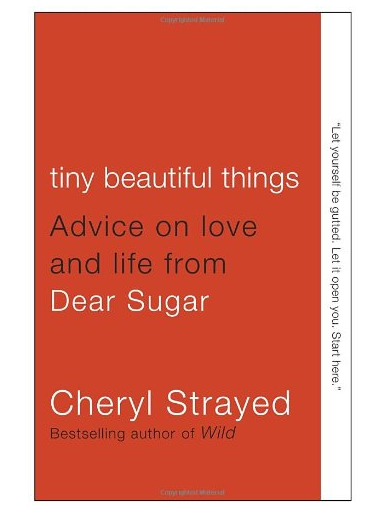 Ever wish that you could give people a piece of your mind and have them wanting more? Or, give feedback that someone really used because it was both tough and compassionate. Or, ask challenging questions in a meeting without being labeled a pain?
Ever wish that you could give people a piece of your mind and have them wanting more? Or, give feedback that someone really used because it was both tough and compassionate. Or, ask challenging questions in a meeting without being labeled a pain?
The best model I’ve found recently for balancing straight talk with caring isn’t in a leadership book. It’s in an on-line advice column “Dear Sugar” by Cheryl Strayed, compiled in her book, Tiny Beautiful Things.
Strayed’s bold. She’s kind. She’s outrageously open and vulnerable. She’s no-nonsense and she’s heartfelt.
(And yes, this is the same Cheryl Strayed whose book Wild is still on the New York Times best seller list after 92 weeks.)
Strayed’s recipe for advice mixes one part straight talk with equal or greater parts compassion.
This isn’t the advice column your mother used to read – with its platitudes and self-righteous, saccharine guidance. Dear Sugar is hip, humble, real, and raw. I devoured it over the holidays.
Unlike the old-style columnists, Strayed shares her own experience in her columns, opening up about her own triumphs, foibles and failings, offering samples of hard-won life experience mixed with servings of humility.
She writes in a voice that’s consistently bold and authentically hers.
It’s a voice that
- can talk tough while offering a hand of caring.
- isn’t afraid to use her life mistakes to give others courage.
- knows the strength of sharing vulnerability.
- won’t tolerate either bullying or wishy-washyness.
- knows that humans make mistakes, all the time – and offers the readers the possibility of moving on with life and finding hope in new choices.
- says “you’ve got to get over it” as well as “I’ve been there and I know how hard it is”.
- has a strong point of view yet acknowledges there could be other perspectives.
- can cry, lend a hand, or offer a kick in the pants.
She’s got the gift of finding words where there are no words – like when she writes to a broken middle aged man who asks her how to deal with the loss of his only son, age 22, to a drunken driver. (Dare you to read her response without tears!)
Some favorite Strayed-isms:
“Nobody will protect you from your suffering. You can’t cry it away or eat it away or starve it away or walk it away or punch it away or even therapy it away. It’s just there, and you have to survive it. You have to endure it. You have to live through it and love it and move on and be better for it and run as far as you can in the direction of your best and happiest dreams across the bridge that was built by your own desire to heal.”
“Nobody’s going to do your life for you. You have to do it yourself, whether you’re rich or poor, out of money or raking it in, the beneficiary of ridiculous fortune or terrible injustice. And you have to do it no matter what is true. No matter what is hard. No matter what unjust, sad, sucky things befall you. Self-pity is a dead-end road. You make the choice to drive down it. It’s up to you to decide to stay parked there or to turn around and drive out.”
“There is no cure except to live the hell out of our lives, to take it apart, to put it back together, to dig it all up, and then fill the hole. To help ourselves and one another to the best of our abilities. To believe everything entirely, while also calling bullshit for what it is.”
“We are all entitled to our opinions and religious beliefs, but we are not entitled to make shit up and then use the shit we made up to oppress other people.”
Finding a kinder, bolder leadership voice.
When I read Dear Sugar, I feel inspired to speak up more. Take risks. Not mince words. Share what I think with an invitation to hear different perspectives.
And that may mean saying that something just sucks.
Last week, a friend, happy in her job and performing just fine, was given the boot. On December 28th, all the members of her department were called into a conference room and told that their operation was being transferred to Ohio. She couldn’t return to her office but had to wait with her colleagues while representatives of HR retrieved her personal essentials– telling her the rest of her stuff “would be mailed.” She and her department mates were then escorted out of the building by armed guards.
That sucks. Corporate security can be addressed without that kind of heartless behavior. Treating people like widgets in a financially driven system is not O.K.
Maybe all my friend needs right now is listening. Maybe it would help to know that it sucks. And after we establish that, I think I’ll give her a copy of Tiny Beautiful Things and a big hug. I think both will help.
p.s. Thanks to Ann Randolph, courageously vulnerable writer and solo performer herself for turning me on to Dear Sugar.










